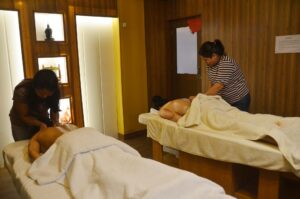Sonam Yangchen comes up to me with a bright and hopeful smile on her face. When I ask if I can interview her, she nods, beaming at me. Just thirty minutes prior, Sonam received her certificate of completion from Lha’s course on traditional Tibetan massage.
Born in Kham, Tibet to a family of nomads, Sonam is one of twelve children and her entire family still lives in Tibet. When she was thirteen, a friend, who was three years older than her, persuaded her to join a group going to India. As Sonam explains, “[my friend] said it’s very good go to India and we can go to school for free. She said a lot of things: maybe we can see His Holiness the Dalai Lama, you know?” And so she went, without telling her family, running away and trekking across the Himalayas to reach India, arriving at the end of 2001. When she first came here, she knew no one other than the group she had crossed the mountains with. She was sent to school in Dharamshala where she stayed for four years before holding various jobs in the area, working at a hotel and then for the Tibetan Welfare Office, helping to pick up garbage.
Sonam’s life took a turn when she started working for an American woman named Diana. Diana had a large property in Dharamshala and needed help taking care of the garden. “First,” she tells me, “I worked for her, and then she [started to] treat me like her daughter. It was very good”. Diana and her friends wanted Sonam to start English classes because although she could communicate in the language well enough, she could not read English. This led her to Lha, where she took classes in both English and Chinese. She attributes her English abilities, which are quite good, to Diana and her friends, along with a group of cultural exchange students with whom she practiced her English at Lha. She made very good friends with three of the students, with one even coming back to Dharamshala to visit a few years later. When Diana passed away two years ago Sonam continued to take care of her property and became a caretaker for other properties in the area.
She heard about the massage and spa course run by Lha and was immediately interested. “I found Tibetan massage interesting, you know?” She tells me. “I did learn stretching massage a little bit before, but I don’t have any experience [with] Tibetan massage. So I wanted to see: what is the difference?” Her interest in massage, she shyly reveals, is connected to her interest in yoga. Her dream is to teach yoga, which she learned a few years ago, and she sees a strong link between Tibetan massage (its focus on pressure points, nerves, and muscles) and her yoga practice. Tibetan massage is unique because of its focus on pressure points, she explains, unlike Swedish massage or aromatherapy.
The massage course met, if not exceeded, Sonam’s expectations. When I ask her what her favourite part of the course was, she quickly responds with “all of the parts!” Sonam especially praises her instructor, telling me that she taught them everything she knew. However, Sonam found it difficult to get comfortable practicing her massage techniques on the men in the course, and letting them practice on her. She explains, “Tibetan girls and women are not very open like western women, so it’s different. So then you know, I say, I’ll practice with the girls.” In a few days, Sonam will start a two-day-a-week internship at a local, Tibetan owned, spa. Afterwards, she plans to continue her caretaker work and pursue her massage work when she is able to realise her dream of becoming a yoga instructor.
Since Sonam left Tibet in 2001 she has not been able to travel back despite her wish, like most children, to see her parents before they pass away. Although she feels very lucky to be in such close proximity to His Holiness the Dalai Lama, she misses her family. Sonam talks to her family on the phone or through WeChat almost everyday, and they consistently implore her to come back to Tibet. “My father, my mom, they always say ‘come back, come back!’ Whenever I talk to them and it makes me very sad,” she says. What her family doesn’t realise, she tells me, is how difficult it is to get the proper papers to go back. She goes to the Chinese Embassy every year, only to get her application rejected and her motives for coming to India in the first place questioned.
When I ask her if she’d like to tell me anything else, she answers immediately: “I want to say thank you to Lha. For organising this programme. It is very helpful and it will be very helpful in the future for many people.” She hopes, one day, to connect her yoga training with her training in traditional Tibetan massage.





 Print
Print Email
Email













